在這篇文章中,我們將看到在 Pandas Dataframe 中將浮點數轉換為字符串的不同方法? Pandas Dataframe 提供了更改列值數據類型的自由。我們可以將它們從 Integers 更改為 Float 類型,Integer 更改為 String,String 更改為 Integer,Float 更改為 String 等。
將浮點數轉換為字符串的三種方法:
方法一:使用DataFrame.astype()。
用法:
DataFrame.astype(dtype, copy=True, errors=’raise’, **kwargs)
這用於將 pandas 對象轉換為指定的 dtype。此函數還提供將任何合適的現有列轉換為分類類型的函數。
範例1:將一列從浮點數轉換為字符串。
Python3
# Import pandas library
import pandas as pd
# initialize list of lists
data = [['Harvey', 10, 45.25], ['Carson', 15, 54.85],
['juli', 14, 87.21], ['Ricky', 20, 45.23],
['Gregory', 21, 77.25], ['Jessie', 16, 95.21]]
# Create the pandas DataFrame
df = pd.DataFrame(data, columns = ['Name', 'Age', 'Marks'],
index = ['a', 'b', 'c', 'd', 'e', 'f'])
# lets find out the data type
# of 'Marks' column
print (df.dtypes)輸出:

現在,我們將“Marks”列的數據類型從 ‘float64’ 更改為 ‘object’。
Python3
# Now we will convert it from
# 'float' to 'String' type.
df['Marks'] = df['Marks'].astype(str)
print()
# lets find out the data
# type after changing
print(df.dtypes)
# print dataframe.
df 輸出:
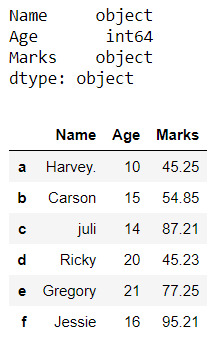
範例2:將多於一列從浮點數轉換為字符串。
Python3
# Import pandas library
import pandas as pd
# initialize list of lists
data = [['Harvey.', 10.5, 45.25, 95.2], ['Carson', 15.2, 54.85, 50.8],
['juli', 14.9, 87.21, 60.4], ['Ricky', 20.3, 45.23, 99.5],
['Gregory', 21.1, 77.25, 90.9], ['Jessie', 16.4, 95.21, 10.85]]
# Create the pandas DataFrame
df = pd.DataFrame(data, columns = ['Name', 'Age', 'Marks', 'Accuracy'],
index = ['a', 'b', 'c', 'd', 'e', 'f'])
# lets find out the data type
# of 'Age' and 'Accuracy' columns
print (df.dtypes)輸出:
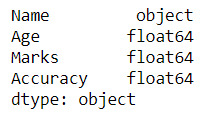
現在,我們將“Accuracy”和“Age”列的數據類型從 ‘float64’ 更改為 ‘object’。
Python3
# Now Pass a dictionary to
# astype() function which contains
# two columns and hence convert them
# from float to string type
df = df.astype({"Age":'str', "Accuracy":'str'})
print()
# lets find out the data
# type after changing
print(df.dtypes)
# print dataframe.
df 輸出:
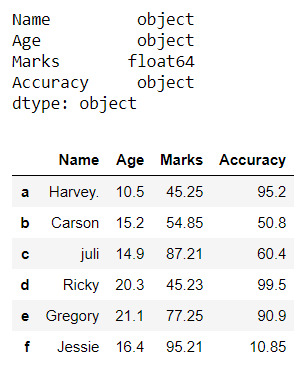
方法二:使用Series.apply()。
用法:
DataFrame.apply(func, axis=0, raw=False, result_type=None, args=(), **kwds)
此方法允許用戶傳遞一個函數並將其應用於 Pandas 係列的每個值。
例:將 DataFrame 的列從浮點數轉換為字符串。
Python3
# Import pandas library
import pandas as pd
# initialize list of lists
data = [['Harvey.', 10.5, 45.25, 95.2], ['Carson', 15.2, 54.85, 50.8],
['juli', 14.9, 87.21, 60.4], ['Ricky', 20.3, 45.23, 99.5],
['Gregory', 21.1, 77.25, 90.9], ['Jessie', 16.4, 95.21, 10.85]]
# Create the pandas DataFrame
df = pd.DataFrame(data, columns = ['Name', 'Age', 'Percentage', 'Accuracy'],
index = ['a', 'b', 'c', 'd', 'e', 'f'])
# lets find out the data
# type of 'Percentage' column
print (df.dtypes)輸出:
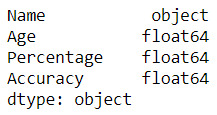
現在,我們將“百分比”列的數據類型從“float64”更改為“對象”。
Python3
# Now we will convert it from
# 'float' to 'string' type.
df['Percentage'] = df['Percentage'].apply(str)
print()
# lets find out the data
# type after changing
print(df.dtypes)
# print dataframe.
df輸出:
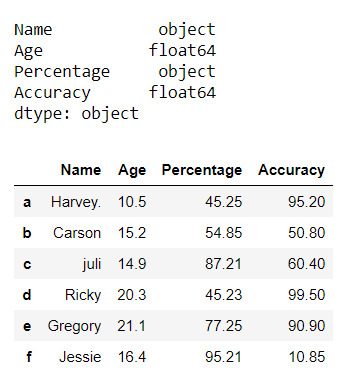
方法3:使用Series.map()。
用法:
Series.map(arg, na_action=None)
此方法用於映射來自具有相同列的兩個係列的值。
例:將 DataFrame 的列從浮點數轉換為字符串。
Python3
# Import pandas library
import pandas as pd
# initialize list of lists
data = [['Harvey.', 10.5, 45.25, 95.2], ['Carson', 15.2, 54.85, 50.8],
['juli', 14.9, 87.21, 60.4], ['Ricky', 20.3, 45.23, 99.5],
['Gregory', 21.1, 77.25, 90.9], ['Jessie', 16.4, 95.21, 10.85]]
# Create the pandas DataFrame
df = pd.DataFrame(data, columns = ['Name', 'Age', 'Percentage', 'Accuracy'],
index = ['a', 'b', 'c', 'd', 'e', 'f'])
# lets find out the data
# type of 'Age' column
print (df.dtypes)輸出:
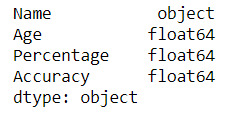
現在,我們將“Age”列的數據類型從“float64”更改為“object”。
Python3
# Now we will convert it from 'float' to 'string' type.
# using DataFrame.map(str) function
df['Age'] = df['Age'].map(str)
print()
# lets find out the data type after changing
print(df.dtypes)
# print dataframe.
df 輸出:
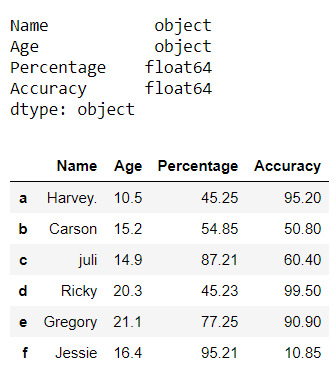
相關用法
- Pandas DataFrame Strings轉Floats用法及代碼示例
- Pandas DataFrame Integers轉Floats用法及代碼示例
- Pandas DataFrame Integers轉Strings用法及代碼示例
- Python Pandas DataFrame.fillna()用法及代碼示例
- Pandas DataFrame Integer轉Datetime用法及代碼示例
- Pandas DataFrame Index轉Column用法及代碼示例
- Pandas DataFrame String轉Integer用法及代碼示例
注:本文由純淨天空篩選整理自vanshgaur14866大神的英文原創作品 How to Convert Floats to Strings in Pandas DataFrame?。非經特殊聲明,原始代碼版權歸原作者所有,本譯文未經允許或授權,請勿轉載或複製。
